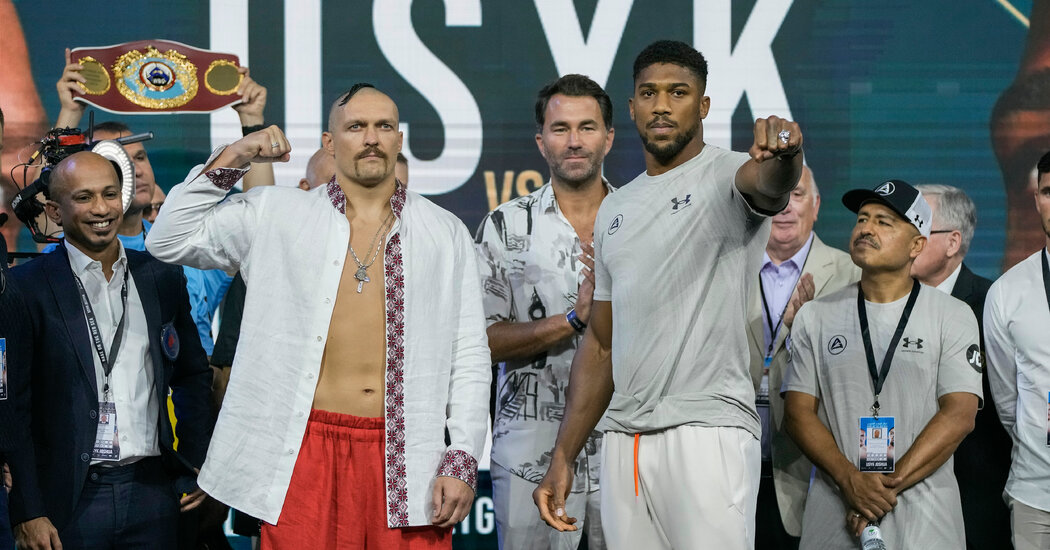Usyk and Joshua to Resettle Heavyweight Picture with Saudi Arabia as Backdrop

When Oleksandr Usyk upset the incumbent heavyweight champion Anthony Joshua in London last September, his win triggered speculation that a rematch could take place in early 2022 in Ukraine, Usyk’s native country.
After the smaller Usyk outboxed the heavily favored Joshua at Tottenham Hotspur Stadium, the parties targeted Kyiv, Ukraine’s capital, for the second fight and mused about a sold-out Olimpiyskiy National Sports Complex.
Russia’s invasion of Ukraine made the prospect of that scene impossible, and it also prompted Usyk, 35, to abandon training for a stint in the Ukrainian army.
The rematch, scheduled for Saturday night, landed at the Jeddah Superdome, a 35,000-seat multipurpose sports arena in Saudi Arabia. And beyond war, the other big factor for the fight’s location is money.
Usyk, who holds titles from three of the four major sanctioning bodies, and Joshua, 32, will evenly split $77 million, the purse put up by Saudi organizers in return for hosting the event.
For Usyk, the bout is another chance to focus the world’s attention on Ukraine as the country’s military resists a Russian invasion that has lasted more than five months.
“I’ve never seen him more determined now,” said Alexander Krassyuk, the chairman of K2 Promotions, the company that backs Usyk. “Not too many people in the world can deliver this message to millions, to hundreds of millions of people. Usyk is able to do that, and he does it in the sport of boxing.”
Early in the conflict, Usyk joined a defense battalion, and he recently told The Guardian that he lost 10 pounds during the first month of the war.
For Joshua, the rematch is a chance to re-establish himself as the world’s pre-eminent heavyweight, which had been his plan going into his first fight against Usyk.
Joshua won Olympic gold in 2012 at superheavyweight, then won 22 straight pro bouts and claimed three of the four major sanctioning bodies’ titles — all before his U.S. debut against Andy Ruiz at Madison Square Garden in June 2019.
Joshua, with his chiseled physique and punching power, figured to dominate Ruiz, a pudgy counterpuncher from Southern California. Instead, Joshua lost by a shocking seventh-round knockout. He had been outfoxed, for the first time, by a smaller, more tactically sound opponent.
Joshua defeated Ruiz in a rematch six months later — in Diriyah, Saudi Arabia — and defended his titles once more before losing to Usyk.
At a pre-fight news conference, Joshua said the titles themselves were less important than the preparation that made him a champion in the first place.
“That’s all at the end of the target,” said Joshua, who weighed just over 244 pounds on Friday. “It’s not like I’m skipping the process. Focus on the process.”
Joshua did not explain whether his process had changed since his loss to Usyk, but he hired a new trainer, Robert Garcia, who is based in Oxnard, Calif., to prepare him for the rematch.
Usyk, for his part, expects Saturday’s bout to be an extension of the first bout, during which his tactics and counterpunching nullified Joshua’s power.
“We’ve had enough time to study each other,” Usyk said through Krassyuk, who interpreted for him. Usyk weighed 221 pounds on Friday.
Their first bout was intended to keep Joshua busy while promoters tried to organize and build up a showdown with Tyson Fury, the World Boxing Council champion. In mid-May 2021, a $150 million undisputed title bout was announced, slated for the summer in Saudi Arabia, but within a week the fight was canceled.
Since then, Fury’s future has become uncertain in the equation that is big-money boxing. He has retired and unretired several times since April, when he knocked out Dillian Whyte to retain his W.B.C. title. (His current status is retired.)
A big factor in this fight is the host: Saudi Arabia is trying to become a constant presence in sports, and not just in boxing, to burnish its global image.
In March, Jeddah hosted a Formula One race, even as a missile attack from Yemeni rebels ignited a fire at an oil depot near the racetrack. And Saudi Arabia’s sovereign wealth fund is bankrolling the upstart LIV Golf series, luring PGA Tour stars away with the prospect of a steep pay raise and a less rigorous schedule.
Saudi Arabia is using investments in sports and other cultural institutions to lift its reputation among people who live in Western countries, away from problems such as the treatment of women and dissidents. Last year, the Biden administration released an intelligence report that said Crown Prince Mohammed bin Salman of Saudi Arabia had approved the assassination of the Washington Post journalist Jamal Khashoggi in 2018.
Sports events function as a public-relations exercise and form a key part of the Saudi government’s long-term plan to transform the country and its reputation. Speaking to reporters earlier this month, Prince Fahd Bin Abdulaziz, a spokesman for the company co-promoting Saturday’s card, described Saudi leadership as “truly invested in the impact sport can have in improving the lives of its people.”
Saturday’s card is just the fourth professional boxing event in Saudi Arabia’s history. The undercard will feature Ramla Ali, a Somali Olympian who will face Crystal Garcia Nova in the first women’s pro bout to take place in Saudi Arabia.
And Usyk, like others in combat sports, figures the country is set to join cities such as Las Vegas and London as a destination for title fights.
“It’s my third time in Saudi Arabia, and I feel like I’m going to be here again and again.”
